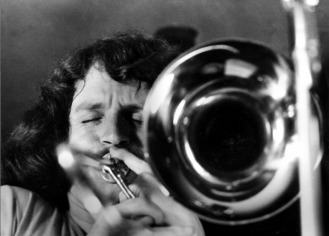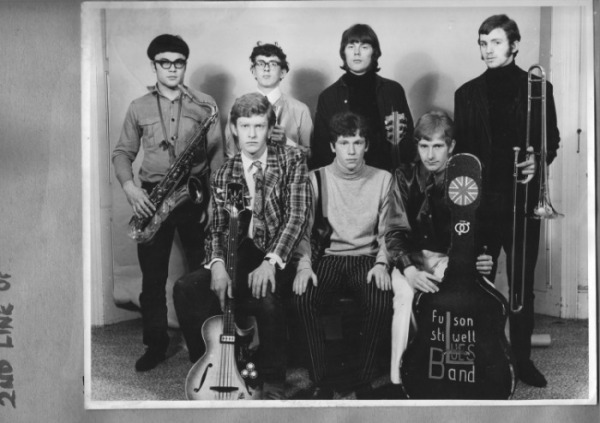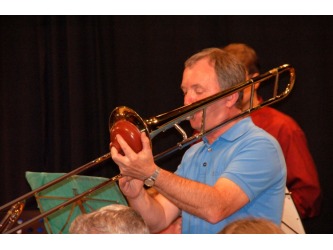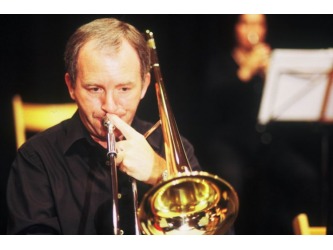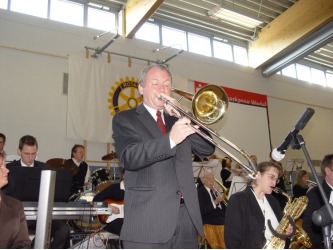PLANETARIUM composed by Nick Ronai
Nick's page
1966 The Fulson Stilwell Band
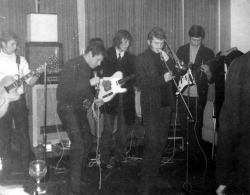
I had been playing in the Fulson Stilwell Band since 1966 when it first started. Playing trombone and a bit of harmonica I was the only horn player until we added a saxophone and finally a trumpet, Joe Spibey. To start with we played mainly blues numbers but with the addition of the other horns we moved into soul and pop numbers. Apart from the Stax repertoire we also loved the New Orleans sound of Allen Toussaint, Lee Dorsey and Curley Moore – a bit obscure but wonderful music! I started arranging by listening to the horn parts and taking them down off the records but everything we played was a copy.
The start of Swegas
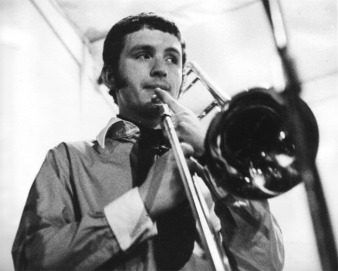
When Fulson Stilwell broke up in 1969, Joe Spibey and I played occasionally with the Cat Road and then started a rehearsal band but the full details of that initial period are very vague. At that time Chicago and Blood Sweat and Tears were just beginning to make a noise in the UK and I am sure they became our inspiration. We gradually gathered other musicians together but when Keith and Roy joined the band things began to happen quite quickly. I now remember recording a first album and that was my first try at writing original pieces. It was all very much trial and error and that original album shows how we were still looking for a sound. Hearing that stuff now brings back some long lost memories!
Eventually, the band settled into its first line-up with Keith, Roy, Stewart, Maurice, John, Chris, Ron and myself. We still needed someone who could write lyrics and when Les Stewart came along we had what we needed. Les’ writing was more like poetry (no “moon” and “June” for him) so it had a major influence on how the music developed especially in the speed and time signature changes. As a compose and arranger I had little idea about the rules and, if anything, was more grounded in classical writing rather than jazz although the years of transcribing soul and pop records did help. Basically, I was fortunate enough to be working with musicians who were prepared to take chances because the arrangements were neither easy nor were they straightforward. I do remember that we rehearsed for a very long time before we went out on the road.
By the time we joined up with the Barry Class Agency we were ready to play live; that was what it had all been about and I was itching to go. I’m not very good about remembering the order in which things happened but the first tour which started in Oslo in 1970 moved onto Zurich, Munich and finally Hamburg does stick in my mind because of the excitement of finally achieving my goal of working as a professional musician. That tour was long and the latter part was very hard work. Numerous late night and early morning sets in the Top Ten Club in the city of Hamburg (where we met Billy, the drummer, and where I live now) were exhausting but the band improved enormously.
Recording and Ronnie Scott's 1970
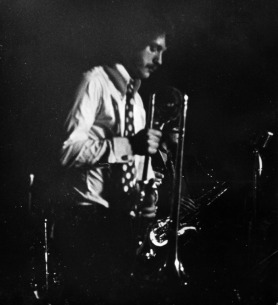
When we returned to UK we were told that we had to go into the studio to record the album which became “Child Of Light”. In retrospect, we should have waited for the new drummer and should have done a lot of things differently but that’s the way it happened and it was a long time ago. Following the release of that album we went on the road again promoting it and the dates just seem to blur into one another. The nights Upstairs at Ronnie Scott’s club were always favourites because we were in town and we could slip down in the intervals to see the bands working downstairs: Phil Woods from the USA, Eric Burdon with War and many other great names and all free!
We toured in Italy and a great deal in southern Germany where we built up a loyal fan following and during that time Chris, the trumpeter, left to be replaced by John MacNicol later to become known as Lennie to distinguish him from John the sax player who was known as Legato anyway. Lennie slipped into the band easily and not long afterwards we went into the studio again to record “Beyond The Ox”. Now that is an album I’m happy to listen to anytime. The band has improved technically, the writing was more mature and the sound was truly our own; an interesting blend of funk, pop, jazz, classical and plain weird – but I think it worked. Sadly, it was only released in Germany on the BASF label (who?) but, if you’re lucky you can still pick up a copy on the internet. By the way, it was in Germany that we met Bernd Cronemeyer and his wife Ingrid. Bernd became our road manager and a good friend to the band. He certainly helped make the travelling a more interesting and lively experience.
Swegas worked on through 1971and played some great, and not so great, venues meeting a lot of bands all trying to break into the big time. Some did and some didn’t and Swegas was one of those. The heavy expense of keeping an eight piece band on the road and maybe the declining interest in the brass sound finally caused the band to split. Bands like Nucleus and If with a more jazzy sound came and went in the UK but no unit managed to sustain the momentum of the US bands like BS&T, Chicago and Tower Of Power. TOP still tour regularly and visit Hamburg every year.
After Swegas
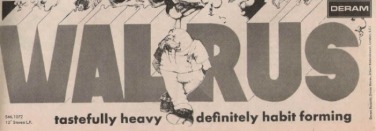
I continued to play in semi-professional bands like Ramrod, Walrus and later in a horn section with Judge Dread but I eventually went into the teaching profession and, after a short period teaching in Richmond, moved to Germany in 1978 to work in international schools. I’m now living in Hamburg working at the International School and playing trombone whenever I can. I write and arrange for local big bands where I play lead trombone and occasionally help out in other bands like Dubtari (ska) and Soulshine (blues and soul).
Working with the guys in Swegas was a great experience with many ups and a few downs but one I wouldn’t have missed for the world.
